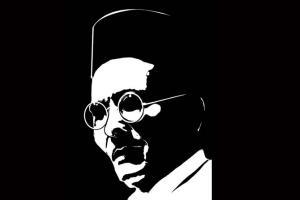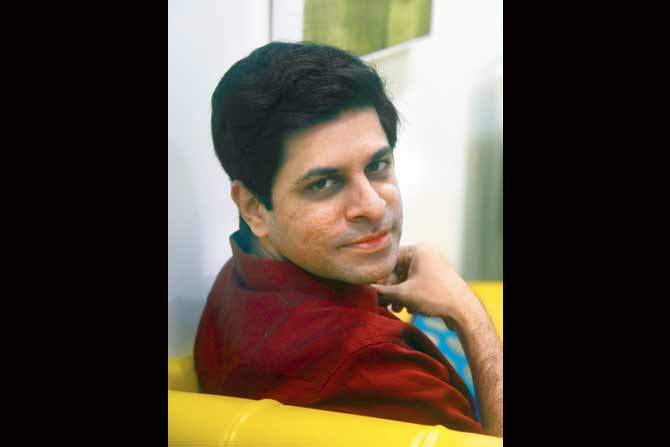The man RSS idolises did not return the favour. He disapproved of cow worship. A new biography investigates Savarkar's many shades of saffron

Illustration/ Uday Mohite
Where politics of reverence makes heroes, the politics of hate creates villains. Revolutionary leader, Hindu nationalist and writer Vinayak Damodar Savarkar (1883-1966), known otherwise as Veer Savarkar, is one such controversial and contested figure who has oscillated between the love-hate spectrum of the country's contemporary history. "The Congress has called Savarkar a traitor, the Congress and the Left have both accused him of writing mercy petitions to the British, the Hindu Right hails him as a hero, and others say he masterminded Mahatma Gandhi's assassination," says Mumbai-based writer and senior journalist Vaibhav Purandare, whose curiosity about this much maligned and equally revered historical figure, saw him invest five years of research into penning a new biography, Savarkar: The True Story of the Father of Hindutva (Juggernaut Books).
Purandare who has previously authored Sachin Tendulkar: A Definitive Biography, and Bal Thackeray and the Rise of the Shiv Sena, says the noise and misinformation around the life of Savarkar, stems from the lack of literature dedicated to the inquiry of his life. "The last proper biography of Savarkar in English was published in 1966 [Veer Savarkar by Dhananjay Keer]. With the rise of Hindu nationalism, there has been renewed attention on him from the mid-1980s onwards and especially, from the time of the rise of Narendra Modi, as Savarkar was the man who founded the theory of Hindutva in 1921. [What is happening today] is more a widespread airing of sharply polarised opinions." But Savarkar, he says, played a stellar role in India's independence movement, calling for complete Swaraj at least 20 years, before the Congress did so in 1929. "Thus, both from the point of view of understanding today's India and understanding his role in the anti-colonial movement, the need to tell Savarkar's
story by marshalling solid facts has never been greater than it is today."
ADVERTISEMENT
The father of Hindutva

Vaibhav Purandare began research five years ago. Pic/ Atul Kamble
As a biographer, Purandare was challenged both by the inadequate texts available on his subject—most of which were written by Savarkar himself—and finding new material that could throw more light on him. "I read everything written by him. The full eight volumes of his writings and speeches, plus accounts by contemporaries, friends and critics, in Marathi, English and Hindi, too. The British government records were crucial in understanding his activities as an anti-Raj revolutionary—the Raj had kept a secret file on him from the time of his early youth." At the age of 23, Savarkar had moved to London and brought together several Indian students at India House—Madan Lal Dhingra who assassinated Sir William Hutt Curzon Wyllie was among them—where he made a concerted effort to fight the cause of freedom.
In search of Savarkar, Purandare even went through newspaper records, in England and India, which covered his tumultuous years in London, from 1906 to 1911, and the debate around his decade-long incarceration in the notorious Cellular Jail on the Andaman Islands. More crucial leads came from Savarkar's tract on Hindutva, which he wrote in 1921—it went on to become a seminal text for Hindu nationalists. But, like all great thinkers, his works need to be carefully analysed and understood, before making him the role model of all things Right.
Because, as a chapter in the book indicates, that while Savarkar was responsible for the term Hindutva entering India's political lexicon, he had made it clear that it was not the same as Hinduism, and had nothing to do with religion or rituals. According to Savarkar, "anyone who considered this nation as his or her pitrubhu (fatherland) and punyabhu (holy land) was a Hindu," Purandare writes in the book.
Not known to many, Savarkar also asked people to abandon the "naive practice of gau poojan" calling it the "murder of the intellect". He saw the cow as a useful animal that needed to be nurtured, instead. "If Hindutva is to sustain itself on a cow's legs, it'll come crashing down at the slightest hint of a crisis," Savarkar wrote in a piece for the Marathi journal, Kirloskar. "Savarkar was all for a scientific approach and wrote a series of essays attacking Hindu orthodoxy, ritual and superstition. On the RSS, he was scathing when he said that 'the epitaph for the RSS volunteer will be that he was born, he joined the RSS and he died without accomplishing anything'," says Purandare.
Having said that, Purandare says it would be incorrect to say that the current Hindutva movement is misrepresenting Savarkar's values. "The answer to this is yes and no," he says, adding, "Savarkar was certainly exclusivist. He believed that those whose holy land was elsewhere would always put their faith before country and thus deserved to be kept out of the scope of Indian nationhood. He pushed for re-conversions, wanted to 'cleanse' Hindi and Marathi of Urdu words, and in the last years of his life called for retaliation against Islamic aggression to the point of advocating sexual violence against women, which was indefensible. Savarkar was a man of extremes, and he draws extreme responses."
Coming clean on Gandhi
Only recently this year, Anand Patwardhan's documentary Reason (Vivek) had questioned the glorification of Savarkar, while pointing out his role, as key mastermind in Gandhi's assassination. "I haven't seen the documentary, so can't comment on it. But, I have meticulously gone through the entire record of the case," says Purandare.
"My approach as a biographer has been clear. I started out seeking neither to indict nor to absolve, but to go by the available evidence on record, before I drew any conclusions. And the evidence, in fact, explains why the jury's still out on the matter as far as Savarkar's involvement is concerned. Savarkar was acquitted as there was no legally admissible, hard evidence. Yet, the prosecution had stacked up a lot of circumstantial evidence, which pointed the finger of suspicion at him. As the then home minister overseeing the murder probe, Sardar Vallabhbhai Patel was convinced about Savarkar's moral responsibility, if not legal culpability, in the killing. Patel wrote about it in a letter to Savarkar's protégé Syama Prasad Mookerjee."
His role apart, both Gandhi and Savarkar, never held back from showering praise at each other, where deserved. "Savarkar was a pivotal figure in the freedom movement in pre-Gandhi India. His work as an anti-colonial agitator and leader of a group of patriotic and revolutionary Indians in London is an important chapter of the liberation movement. For Gandhi, Savarkar was an equal, a man who, according to the Mahatma's own admission, saw the evil that the British Empire represented much before he himself did," says the writer.

Illustration/ Uday Mohite
Savarkar, he explains, was a complex personality, who cannot easily be placed into neat boxes. "Just when you think he fits into one box, out he comes and gets into another, and then into some other boxes as well. It's only when you see all the boxes together that you get to know him—the pieces of the puzzle then come together, otherwise we're just seeing incomplete parts."
What Savarkar wrote
Majhi Janmathep (My Transportation For Life): In this book, Savarkar wrote about the horrors of being incarcerated in the dreaded Cellular Jail (Kaala Paani prison) on Andaman Islands. Once, he was given ten days in 'crossbar fetters' for defying work orders. A crossbar fetter was a metal triangle tied at three points—the ankles and waist—which once fixed, ensured you couldn't bend.
Hindutva: In this tract, Savarkar set out to discuss his theory of Hindu nationalism or Hindutva. It eventually became part of the political lexicon of the country.
Gandhi Gondhal (The Gandhian Confusion): This is a collection of critical essays by Savarkar on Mahatma Gandhi. In one essay, Savarkar questions Gandhiji's rashness in calling "Islam the religion of peace". In another, he is harshly critical about Gandhi's means to achieve freedom.
1924
The year Savarkar stepped out of jail—13 years after he'd been despatched to the Andamans—to live in Ratnagiri
Catch up on all the latest Mumbai news, crime news, current affairs, and also a complete guide on Mumbai from food to things to do and events across the city here. Also download the new mid-day Android and iOS apps to get latest updates
 Subscribe today by clicking the link and stay updated with the latest news!" Click here!
Subscribe today by clicking the link and stay updated with the latest news!" Click here!






